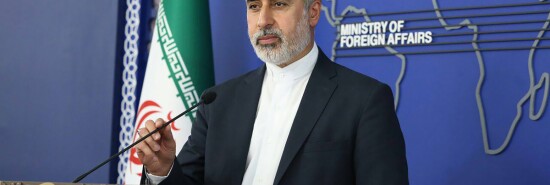
Why Iran says a US-Israel-Saudi Arabia peace deal would harm regional peace
Jack Elbaum
Video Embed
Iran is the world’s largest state sponsor of terrorism. But Reuters reported on Monday that it suddenly has a lot to say about regional “peace” and “stability.”
What prompted its newfound concern? Well, chatter about a possible deal between the U.S., Saudi Arabia, and Israel is rising. President Joe Biden’s national security adviser Jake Sullivan just completed a trip to Saudi Arabia to discuss the possibility of establishing diplomatic relations between it and Israel. Biden recently outlined what such a deal may look like to the New York Times’s Thomas Friedman. And Mossad Director David Barnea “secretly visited Washington nearly two weeks ago for talks with senior White House and CIA officials” about these efforts.
BEST WAY TO STOP CHILD LABOR IS TO SECURE THE BORDER
In all likelihood, the U.S. would have to make significant security guarantees to the Saudis, including “a NATO-level mutual security treaty that would enjoin the United States to come to Saudi Arabia’s defense if it is attacked (most likely by Iran); a civilian nuclear program, monitored by the United States; and the ability to purchase more advanced U.S. weapons.” The Saudis would recognize and normalize relations with Israel — an almost unbelievable thing to suggest — while also “curtailing” its relationship with China. Israel would make significant tangible and on-the-ground concessions to the Palestinians in the West Bank.
Saudi Arabia benefits from the U.S. security guarantees and the economic opportunity that comes along with normalization with Israel — while also getting credit for not ignoring the Palestinians. Israel gets normalization with one of the most powerful and influential Muslim countries in the world, which means becoming more accepted in the region and opening the door to other normalization deals down the line. The U.S. benefits from moving Saudi Arabia away from its cozy relationship with China, increasing regional cohesion, and bringing Israel away from the “brink” its far-right brought it to.
Whether this deal will actually happen is still very much up in the air. It would require significant concessions by each country that cannot be taken for granted. But, if it did happen, it certainly has the possibility of reshaping the dynamics of the Middle East along entirely new lines. Specifically, this would be a significant step toward creating a Middle East that is largely split into two camps: those who are pro-Iran and those who are anti-Iran.
It already began with the 2020 Abraham Accords, but this would solidify the new dynamics.
So it makes sense why Iran is so terrified of even the possibility of a deal: It hates the United States, Israel, and Saudi Arabia and knows if they become closer with one another, it presents a threat to the power it is trying to entrench across the region through its myriad terror proxies in Yemen, Syria, Lebanon, Iraq, Gaza, and the West Bank.
But isn’t that ironic? Iran believes the prospect of peace between two countries that have been sworn enemies until this point is a threat to peace while its sprawling network of terror affiliates is not.
The only way to reconcile the statements is if one understands that by a threat to “peace,” Iran actually means a threat to its ambitions to become a regional hegemon.
CLICK HERE TO READ MORE FROM THE WASHINGTON EXAMINER
Jack Elbaum is a summer 2023 Washington Examiner fellow.
